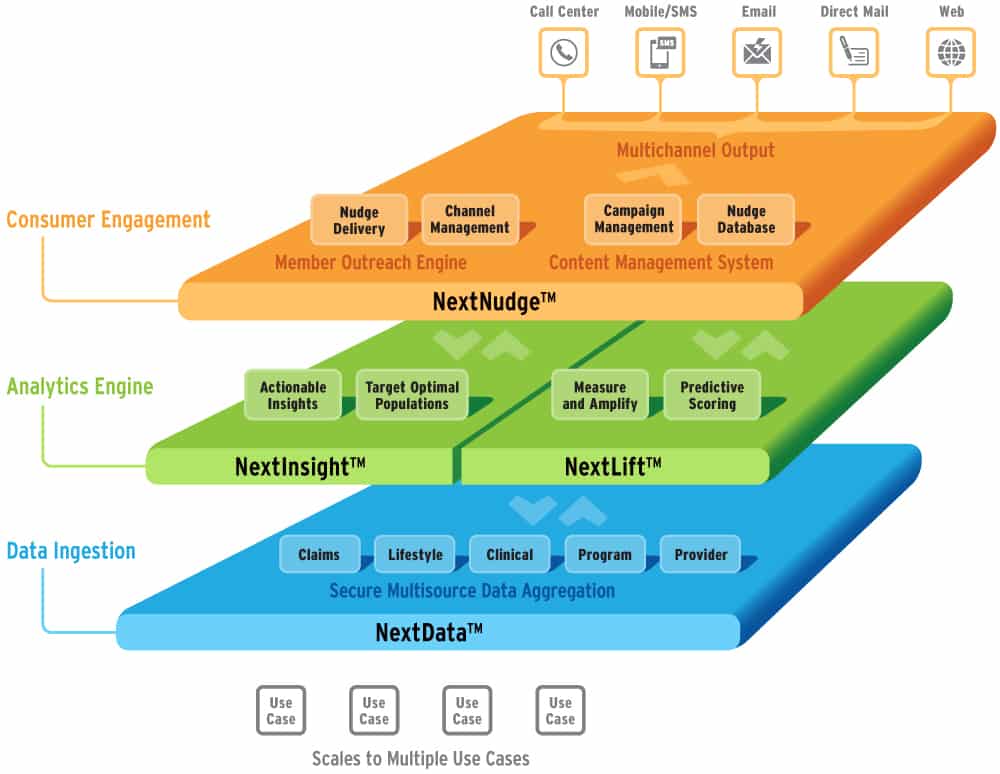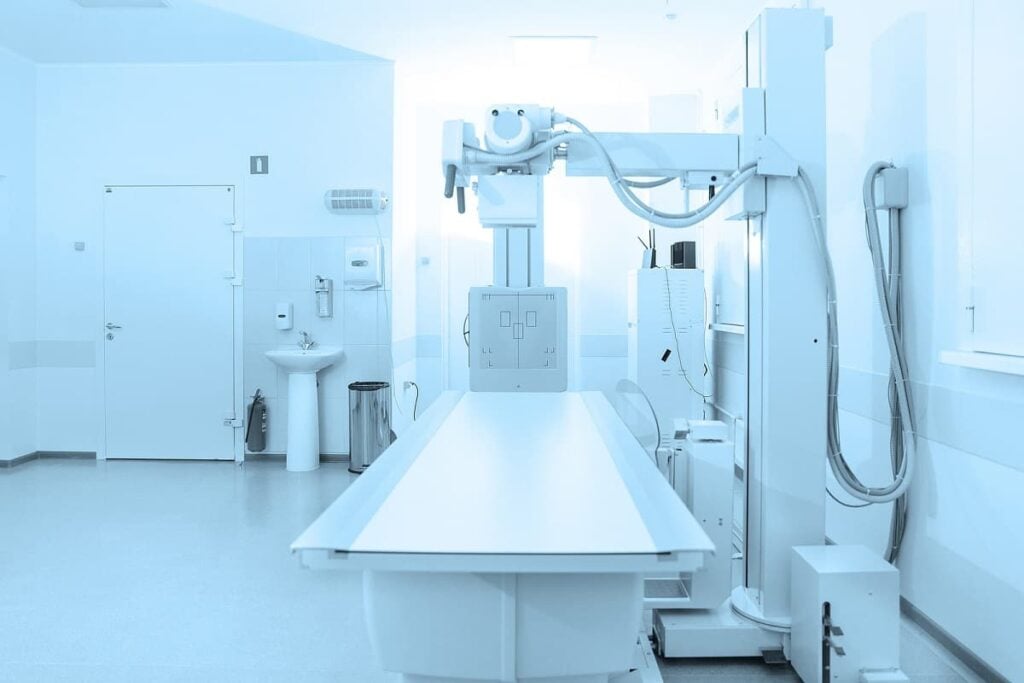6 AI Startups for Healthcare Management
Table of contents

The Magic Mountain roller coaster ride of the last week or so in the market seems almost Disney cartoonish. At times like these, investors might be tempted to invest in voodoo dolls and chicken bones in a desperate attempt to figure out what to do next. It certainly seems like today’s market reacts intuitively with little regard for economic reality—good or bad. If someone like Amazon’s Jeff Bezos, for example, even sneezes in a suggestive way, the market cowers like a beaten dog.
Bezos sneezed a couple of weeks ago, and $30 billion of value blew away in the wind. The cause: Amazon, Berkshire Hathaway, and JP Morgan announced that they would form healthcare services companies for their 1.2 million employees. That day, the 10 largest public health insurance and pharmacy companies lost $30 billion in market cap in two hours.

Of course, that’s a drop in the bucket compared to $3.3 trillion spent on U.S. healthcare, accounting for about 18 percent of the country’s gross domestic product.
That’s certainly incentive for Bezos and company to reinvent healthcare. No doubt their approach will involve a technological twist that will feature artificial intelligence to manage the system more efficiently, from basic bookkeeping and insurance to developing and supporting treatment plans. (Interestingly, Amazon is way behind in the behind-the-scenes patent wars for digital healthcare.) We’ve already seen the money attraction between AI and healthcare: The top five AI healthcare startups back in 2016 had raised $600 million. CB Insights reported that through March of last year, AI in healthcare led all other industrial applications of AI in terms of equity deals, raising $1.8 billion across 270 deals since 2012.
Below we highlight the sort of AI healthcare management tech that startups are developing today that could become part of the healthcare system of tomorrow. Or something cool like that.
Predicting Disease
![]() Founded in 2010, New York-based Prognos figures the best defense against disease is a good offense powered by artificial intelligence. The startup has raised $43.2 million, including a $20.5 million Series C last November. Some of the standout names supporting Prognos: Merck (NYSE:MRK), Cigna (NYSE:CI) and Guardian Life Insurance. As we know, AI is generally useless unless it has ingested lots and lots of delicious big data. In the case of Prognos, it has developed a thousand algorithms from 13 billion medical records to detect disease early for better treatment options, which in theory should help drive down healthcare costs. Its platform covers 50 disease areas, from chronic conditions like diabetes to life-threatening ones such as cancer, based on lab data. The company is definitely preaching to the pharmaceutical industry, noting that lab data drive 70 percent of medical decisions.
Founded in 2010, New York-based Prognos figures the best defense against disease is a good offense powered by artificial intelligence. The startup has raised $43.2 million, including a $20.5 million Series C last November. Some of the standout names supporting Prognos: Merck (NYSE:MRK), Cigna (NYSE:CI) and Guardian Life Insurance. As we know, AI is generally useless unless it has ingested lots and lots of delicious big data. In the case of Prognos, it has developed a thousand algorithms from 13 billion medical records to detect disease early for better treatment options, which in theory should help drive down healthcare costs. Its platform covers 50 disease areas, from chronic conditions like diabetes to life-threatening ones such as cancer, based on lab data. The company is definitely preaching to the pharmaceutical industry, noting that lab data drive 70 percent of medical decisions.
As Prognos COO Lisa Kerber wrote:
“Coupling billions of lab results with AI enables predictions to be made about which physicians will have relevant patients before a patient is tested and results are delivered. It is precisely this AI capability that holds the greatest value to everyone in healthcare.”
While predicting disease to save lives is noble, predicting disease to sell more drugs seems like another way for pharmaceutical companies to create another opioid epidemic. Let’s hope the primary motivation is the former.
Apps Aplenty
![]() Founded in 2011, London-based Medopad has raised $32 million for AI-powered apps targeted for various segments of the healthcare system, such as an interface between patients and doctors. It announced $28 million in new funding just this month, with an eye toward eventually completing a $120 million Series A. The company’s software captures data from smart devices, from watches to asthma inhalers, and transmits the information to healthcare providers. Medopad says its machine learning capabilities analyze the collective data to develop predictive insights to detect life-threatening medical conditions for early interventions. It’s yet another form of personalized medicine.
Founded in 2011, London-based Medopad has raised $32 million for AI-powered apps targeted for various segments of the healthcare system, such as an interface between patients and doctors. It announced $28 million in new funding just this month, with an eye toward eventually completing a $120 million Series A. The company’s software captures data from smart devices, from watches to asthma inhalers, and transmits the information to healthcare providers. Medopad says its machine learning capabilities analyze the collective data to develop predictive insights to detect life-threatening medical conditions for early interventions. It’s yet another form of personalized medicine.

The startup has entered into a number of strategic partnerships, especially in China, where it says it has more than £100 million (about $140 million USD) in new contracts. In particular, Medopad is teaming up with global tech giant Tencent, which has a billion customers feeding it data on the WeChat mobile platform. Other partners include HP, Lenovo, and Johns Hopkins University. Medopad says it has experienced 400 percent growth in the value of projects year-on-year since 2015.
Update 11/05/2019: Medopad has raised $25 million in Series B funding to develop biomarkers tracked by apps and wearables. This brings the company’s total funding to $54 million to date.
Changing Behaviors
 Founded in 2013, NextHealth Technologies out of Colorado has raised $9.8 million for its AI-powered open-source platform designed to identify high-risk populations and bring healthcare costs down for insurers. How? Again, it starts with data, such as claims data and clinical statistics. Machine learning then goes to work to predict future behavior. For example, its platform can predict emergency room visits by identifying risks and use patterns within populations. The platform identifies at-risk populations where action could make the most impact, initiating intervention campaigns and measuring the results.
Founded in 2013, NextHealth Technologies out of Colorado has raised $9.8 million for its AI-powered open-source platform designed to identify high-risk populations and bring healthcare costs down for insurers. How? Again, it starts with data, such as claims data and clinical statistics. Machine learning then goes to work to predict future behavior. For example, its platform can predict emergency room visits by identifying risks and use patterns within populations. The platform identifies at-risk populations where action could make the most impact, initiating intervention campaigns and measuring the results.

In one case involving a Colorado-based nonprofit health plan provider, NextHealth helped reduce ER visits by more than 6 percent and saved $6 per member per month. For example, targeted members were “nudged” to seek care advice for non-emergency conditions, probably related to freakouts from visiting too many European cannabis clubs.
The Robot Will See You Now
 Founded in 2014, Catalia Health has raised $7.8 million, with most of the money coming from two Seed rounds and a grant last year. The company is developing an interactive robotic “coach” called Mabu, which seems similar to the AI-driven robots being marketed toward elderly populations we covered recently. In this case, Mabu is intended to work with all sorts of patients but targeted for those living with chronic diseases such as diabetes to help manage their medical conditions. Mabu ensures medications are taken regularly but also collects information related to daily health based on a Q&A with the patient. Data collected is then sent to a care team for analysis and action. Catalia’s business model envisions pharmaceutical companies or insurance carriers providing the personal pill pusher medical assistant free of charge to customers.
Founded in 2014, Catalia Health has raised $7.8 million, with most of the money coming from two Seed rounds and a grant last year. The company is developing an interactive robotic “coach” called Mabu, which seems similar to the AI-driven robots being marketed toward elderly populations we covered recently. In this case, Mabu is intended to work with all sorts of patients but targeted for those living with chronic diseases such as diabetes to help manage their medical conditions. Mabu ensures medications are taken regularly but also collects information related to daily health based on a Q&A with the patient. Data collected is then sent to a care team for analysis and action. Catalia’s business model envisions pharmaceutical companies or insurance carriers providing the personal pill pusher medical assistant free of charge to customers.
Dialing in Drug Delivery
![]() Founded in 2015, San Francisco-based InsightRX raised $2.8 million in disclosed funding for its personalized medicine platform that uses machine learning to optimize drug selection and dosing for patients. The algorithms leverage everything from genomics to demographics to tweak recommendations for medication use. In theory, that should lead to better outcomes and less time spent in hospital, yet another way to reduce costs and perhaps mitigate the effects of our current opioid crisis. Like all machine learning models, the data collected from the pharmacies and physicians who use the platform will help improve the pharmacological models used for dosing recommendations. Insight RX is used by a number of hospitals and research centers, including biotechnology company Genentech.
Founded in 2015, San Francisco-based InsightRX raised $2.8 million in disclosed funding for its personalized medicine platform that uses machine learning to optimize drug selection and dosing for patients. The algorithms leverage everything from genomics to demographics to tweak recommendations for medication use. In theory, that should lead to better outcomes and less time spent in hospital, yet another way to reduce costs and perhaps mitigate the effects of our current opioid crisis. Like all machine learning models, the data collected from the pharmacies and physicians who use the platform will help improve the pharmacological models used for dosing recommendations. Insight RX is used by a number of hospitals and research centers, including biotechnology company Genentech.
Update 09/23/2019: InsightRx has raised $10 million in Series A funding to broaden its therapeutic areas and provide additional hospitals and pharmaceutical companies with access to its innovative technology. This brings the company’s total funding to $12.8 million to date.
Don’t Be Late
![]() Founded in 2014, Seattle-based macro-eyes received a $100,000 grant from the Bill and Melinda Gates Foundation. While the startup is working on several AI healthcare products related to clinical outcomes and supply chain, its main product to date appears to be an AI-powered scheduling tool called Sibyl. The company says patients don’t show for up to 20 percent of scheduled medical appointments, resulting in $150 billion in losses each year. Sibyl can predict which times are best for both patients and providers and costs $25,000 per site per year.
Founded in 2014, Seattle-based macro-eyes received a $100,000 grant from the Bill and Melinda Gates Foundation. While the startup is working on several AI healthcare products related to clinical outcomes and supply chain, its main product to date appears to be an AI-powered scheduling tool called Sibyl. The company says patients don’t show for up to 20 percent of scheduled medical appointments, resulting in $150 billion in losses each year. Sibyl can predict which times are best for both patients and providers and costs $25,000 per site per year.
Conclusion
Healthcare is expected to be one of the main areas where AI will make deep impacts in the years to come. One key area that we’ve discussed before is medical imaging, a $30 billion-plus market. AI chatbots are another emerging trend in the healthcare space, and even telemedicine is embracing AI solutions. We expect these and other technologies will be at the core of the new Amazon-led healthcare initiative, which could disrupt the $3.3 trillion healthcare industry if successful. Some of these AI startups might make interesting acquisitions down the road toward that new digitized business model.
Sign up to our newsletter to get more of our great research delivered straight to your inbox!
Nanalyze Weekly includes useful insights written by our team of underpaid MBAs, research on new disruptive technology stocks flying under the radar, and summaries of our recent research. Always 100% free.














